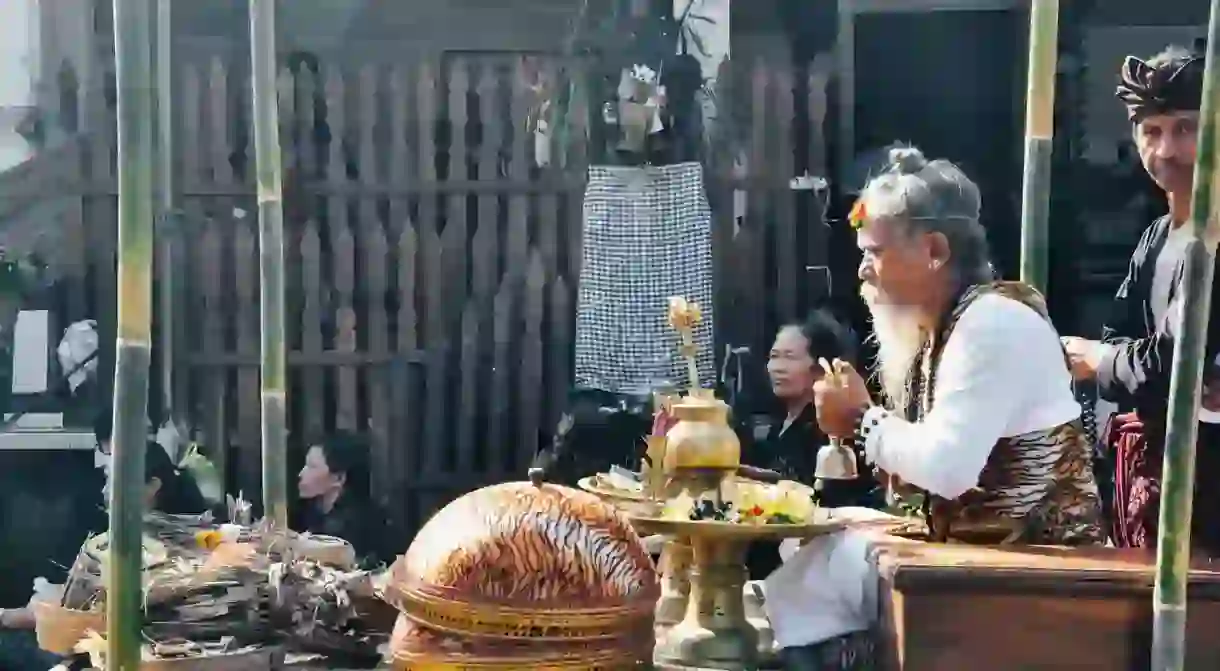A Festive Cremation: Bali's Ngaben and the Celebration of Death

A big fire is fervid and ablaze as the woods crackle along with a deceased loved one. For the Balinese, a much more important process is happening than mere combustion of things. It’s a sacred cremation, a joyous occasion, and the deceased is soon to reach another form of life.

Ngaben is one of the most important ceremonies in Balinese culture and probably the most significant in a life of a Hindu Balinese. It’s a centuries-old tradition culminating in the cremation of the deceased body.

There are many reasons that motivate people to opt for cremation, but what makes ngaben different from other similar practices is the intricate philosophy that underlies it. Like many other belief systems, Balinese Hindus believe that the self is composed of the spiritual and the physical. When what we know, is that as a dying process occurs, it extinguishes the physical body, but the spirit (or Atma) lives on. In fact, death is often described as a long sleep, when the physical body is incapacitated but the person is not totally gone.

Ngaben, then, is carried out to free the spirit from the mortal body. When the fire incinerates the body, it devours the elements that form the physical body (known as the Panca Mahabutha), releasing the spirit from worldly shackles and allowing it to leave for another form of life.

Ngaben and Reincarnation
As Hindus, Balinese believe in the cycle of life and death, that the soul is eternal and has to return back to the physical world time and time again, working through its karma until deemed pure to reach eternal rest. The ngaben ceremony enables the soul to be free from the shackles of the body and ushers the soul to the next life. After cremation, the soul could be given another physical body and continue the life cycle, or achieve moksha, a final rest in heaven. Anyhow, death is not the end and the ceremony itself is a reflection of that.

That’s why ngaben is more a joyous occasion than mourning. Families are hopeful that their loved ones are granted a better life, or better yet, an ultimate stay in heaven. During this ceremony, families are even advised not to shed a tear, as it may hinder the soul’s path to heaven. The physical body, on the other hand, will be shattered by the fire and reunite with the earth.

What Happens During Ngaben
The date of the ceremony is determined by elders according to the Balinese calendar system. Ngaben could be held soon after a person’s death or long after, depending on the families’ preferences and situation. Many families choose to delay the ceremony as they save money to throw the grand and festive ceremony and take care of all preparations. During this time, the deceased body can be buried temporarily or kept in local traditional halls. There are different kinds of ceremonies for different circumstances, including if the body is missing, abroad, or if the deceased is a child or even an unborn baby.

Although generally known as traditional cremation, the ngaben ceremony involves a lot more rituals, starting with calling out the atma or soul, especially if the deceased passed away outside of the home—maybe an accident, in a hospital, or such. After that, the body is cleansed and given symbolic amenities to make sure he or she will receive a perfect body in the next life. The elders and priests will then pray for the soul of the deceased, asking for a smooth journey to the other side.

The next ritual involves the family, as they symbolically show their acceptance of their beloved’s departure from this life. Afterwards, the body will be laid inside a coffin, the coffin inside an ox-shaped or temple-shaped sarcophagus, and carried around in certain manners as a way to return the physical elements of the body to the universe and saying goodbye to families and relatives, as well as the local community.

Only after that the body will be set on fire, but not before another set of prayers and mantras. The fire will then devour the whole body, and the remaining bones will be crushed separately. After that, the ashes will be released into the sea or river. That concludes the long, intricate process of celebrating death and welcoming new life.














